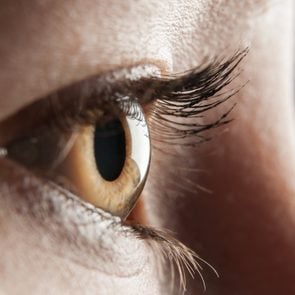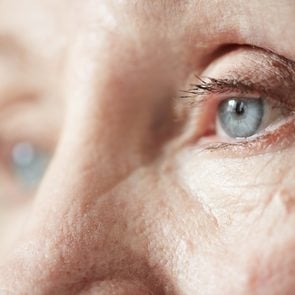5 Reasons Why Your Eyes Are Itchy
Updated: Jun. 29, 2022
Irritated eyes can be a sign of allergies or a serious eye condition. Our experts explain the possible causes of itchy eyes, offer treatment advice, and clarify when to seek medical care.
What can cause itchy eyes?
Itchy, burning, and red eyes can be more than an annoyance. This is often a sign of your body’s response to an allergy, infection, or irritation that needs attention.
If left untreated or ignored, it could lead to serious eye complications, say medical professionals.
“Without proper treatment, eye damage can lead to a partial loss of vision or even permanent blindness,” warns William T. Reynolds, a doctor of optometry, president of the American Optometric Association, and president and CEO of Eye Care Center Optometrists in Richmond, Kentucky.
So why are your eyes so itchy and irritated? Here are some common causes—plus medical advice for managing the itch.
Allergies (allergic conjunctivitis)
More than 50 million Americans suffer from some type of allergy, according to the American College of Allergy, Asthma, and Immunology (ACAAI).
An allergic reaction is your immune system‘s defense against a foreign substance. Most people with allergies say their attacks come with eye irritation—itching, burning, redness, and discharge—known as allergic conjunctivitis.
Finding the allergen that causes the allergy attack is the key to optimal outcomes. While there are many causes of allergies, most fall into broad categories, such as pollen, food, insects, latex, mold, pets, and drugs.
Getting a diagnosis
Belinda Graham, MD, an allergist and immunologist with Wellstar Health System in Georgia, starts with a skin test to help pinpoint the allergens.
A tiny drop of a possible allergen is pricked or scratched into the skin to see the body’s response. Positive hits can appear in minutes.
“Historically, the skin test has been found to be the most accurate and fastest way to determine if a person is allergic to something,” she says, noting that a blood test is a good alternative if you can’t do a skin test.
The results of allergy testing can help doctors develop allergy treatment plans for patients.
Eye irritations related to allergies are either seasonal or perennial, depending on when and how often they occur.
Seasonal allergies
If you find your itchy, red eyes bloom along with your garden, you likely have seasonal allergies.
According to the Asthma and Allergy Foundation of America, the most common trigger for allergic conjunctivitis is pollen from trees, grasses, and weeds during the spring and fall months. But you can have summer allergies too.
“Allergic conjunctivitis typically affects both eyes,” Dr. Graham says. “If the reaction is only in one eye, then I think of other causes of symptoms.”
If it feels like pollen seasons are lasting longer than usual, it’s true. A recently published study indicates that, due to climate change, pollen seasons in North America are now 20 days longer than they were in 1990 and have higher pollen concentrations.

Perennial allergies
Seasonal allergies spike during spring and summer, usually due to allergens originating outdoors. Perennial allergies, on the other hand, can occur year round and usually come from indoor triggers.
These include some visible sources, such as cockroaches and pet dander, as well as microscopic mold spores or dust mites that can still pack an allergic punch.
While the allergic reactions are similar—including itchy, red eyes—perennial allergies tend to be milder, according to the ACAAI.
Treatment for allergic conjunctivitis
There is no cure for allergies, but the impact can often be managed through treatment and prevention.
Allergists recommend you limit or avoid outdoor time during high-pollen seasons, remove shoes before coming inside, take showers before bed, keep windows and doors closed, dust and vacuum regularly, invest in HEPA air filters, and avoid sleeping near pets.
Dr. Graham says there are also a number of highly effective medications for allergies. These include nasal steroids, such as Flonase, Nasonex, and Rhinocort; nasal antihistamines, like Astelin and Patanase; and eye drops, including Pataday, Zaditor, or Alaway.
Over-the-counter antihistamines like Zyrtec, Xyzal, Claritin, and Allegra are also effective for allergies, she adds.
The ACAAI also recommends immunotherapy to build up allergy resistance. This involves giving small doses of the allergen over time to “train” the immune system to becomes less sensitive.
Infections (infectious conjunctivitis)
Bacteria and viruses live all around us (and on us), and sometimes they make their way into our eyes, where they can cause trouble. Basic hygiene often keeps these bugs away.
“The most common cause of eye itching originates from the normal flora that live on our skin,” says Gayle Leff Goldstein, MD, an ophthalmologist at Georgia Eye Partners in Atlanta.
Resist the temptation to rub your itchy eyes, she says. Hands and fingers tend to be especially rich with bacteria, and they can offer a perfect passageway to your eyes. The result: infection, styes, redness, and discharge.
Over time, poor eye hygiene can lead to blepharitis—a serious infection caused by clogged oil glands on the eyelid. Symptoms include itching, redness, mucus, and eye fatigue—and can cause bacterial ulcers that lead to a loss of vision or chronic pain.
When symptoms of irritation first occur, clean along the lash line a few times a day. Dr. Goldstein recommends a targeted solution, such as Ocusoft, which keeps oil glands open and eyelids healthy.
Other home remedies include warm compresses on eyelids to relieve swelling, corticosteroid eye drops or ointments to help with inflammation, and lubricating eye drops to avoid dry eyes.
Dr. Goldstein warns that if there is pain, not just irritation, see an eye doctor as soon as possible.
Irritants
Smoke, perfume, exhaust, foul odors, and chlorine are not allergens, but they can lead to itchy, irritated eyes. The goal is to either avoid the irritants you are most sensitive to or limit the exposure.
Dry eyes
Dry eyes may arise from a medical disorder caused when the eyes don’t produce enough tears or the tear quality isn’t good.
Dr. Goldstein says it generally occurs as people age and can lead to itching, redness, and pain. There are a lot of other potential causes of dry eye, including certain medications, computer use, medical conditions, laser eye surgery, contact lens wear, and more.
Treatment options are widely available. While surgery can be performed, over-the-counter eye drops—aka artificial tears—can also help.
Improper contact lens care
Contact lens wearers who develop itchy, irritated eyes should not ignore the symptoms.
A report by the Centers for Disease Control and Prevention (CDC) found that keratitis, a painful eye infection linked to improper contact lens care, leads to 1 million doctor or hospital visits each year. About 2,000 people eventually lose their eyesight as a result.
The problem, according to the CDC, is that the majority of the nation’s 45 million contact lens wearers don’t follow basic care guidelines.
Sleeping in contacts is a big no-no, says Dr. Goldstein, who also advises steering clear of extended-wear contacts.
“The eyes need moisture and oxygen,” she says. “Once the eyes are irritated and patients rub their eyes, the opportunity for infection increases.”
A study in the Journal of Ophthalmic and Vision Research linked red, itchy eyes to early signs of giant papillary conjunctivitis, a serious eye disease linked to contacts.
The American Academy of Ophthalmology recommends a two-week break from contacts to give your eyes time to heal and prevent permanent damage from occurring.
When to see a doctor
While itchy, irritated eyes often can be treated at home with over-the-counter medications, Dr. Reynolds says many eye-related issues require medical care.
Foreign objects and chemicals in the eye, swelling, bleeding, or pain are obvious reasons to see an eye doctor. Persistent redness and itchy eyes should also raise alarms.
Many people delayed medical care during the Covid-19 pandemic, Dr. Reynolds notes. Doctors are now seeing patients with vision problems after months spent in front of computers and screens.
“By detecting eye and vision problems [early], a doctor can help put patients on the path to good health long before irreparable damage occurs,” Dr. Reynolds says.
Next, learn the nine reasons you might have bloodshot eyes.






















